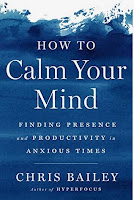THE STRESS PRESCRIPTION (Seven Days to More Joy and Ease) by Elissa Epel (co-author of The Telomere Effect) is part of a series; other titles, also written by experts in their respective fields, include The Love Prescription and The Sleep Prescription. Epel is the director of UCSF’s Aging, Metabolism, and Emotion Center and serves on scientific advisory committees for the National Institutes of Health and the Mind & Life Institute. In this primer, she encourages readers to “read a chapter a day or a chapter a week” and offers one new skill (e.g., Embracing Uncertainty and Openness) per chapter. Epel provides a great deal of reassurance and plenty of personal examples, but not as much practical advice as I had envisioned. To me, there was simply too much emphasis on her own stories (e.g., running out of pipettes due to supply chain issues) and less on helping readers to really adopt some lifestyle practices. A positive element is that her suggested activities “need no special equipment, and at most take five to ten minutes.” That short timeframe may make her recommendations attractive and “do-able” for readers. Almost twenty percent of the book is devoted to a listing of further reading and resources and extensive notes.
HOW TO CALM YOUR MIND by Chris Bailey is about “Finding Presence and Productivity in Anxious Times” and is also published by Penguin Life. Like in his earlier work, Hyperfocus, Bailey offers suggestions primarily for adult professionals. He notes, for example, “When you see everything you do through the lens of the accomplishment mindset, everything in your life looks like something you have to get done. In this way, an accomplishment mindset compromises how much joy you experience each day, as you alternate between periods of productivity, as well as guilt.” Bailey acknowledges investing in self-care through activities like meditation, exercise, getting a massage, and/or adopting a better diet, but he advocates doing more to reduce chronic stress, burnout, and anxiety. Bailey uses personal experiences to illustrate his points; plus, over ten percent of the book lists notes, including references for numerous scientific papers, which support his contentions.
Concerns about stress and anxiety apply especially to young people; on a related note, see the article in today's Wall Street Journal from the Weekend Interview about "Jonathan Haidt on the ‘National Crisis’ of Gen Z." It is a sobering piece.







